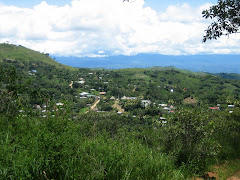My training community is a small, peaceful town up in the mountains, near San Jose. With a population of approximately 7,000 people (it seems like less), a main road splits the town down the middle with houses and fincas stretching out on both sides. Most people work in San Jose, and many women stay at home to care for their children. Some of them have side businesses, as well.
My host family challenges most of what we were told to expect: machismo, strong religious values, and conservative thinking. Consequently, they stand out from the rest of the community. This is especially true for my host mom, who has always felt like she doesn’t belong. Light-skinned, blond-haired, with blue eyes, she looks different from most people here, including her immediate family. In school, girls would call her “gringa tonta” and reject her company. She would spend most of her time playing with boys and has always found it difficult to deal with other women. At home, my host mom’s parents discouraged her free spiritedness. Independent and nonconformist, she left for San Jose at an early age. Here she met another oveja negra, my host dad. Today, they live in union libre with their six-year-old son. (Despite the disapproval of the Catholic Church, more and more couples are opting to forgo marriage, probably given the high rate of divorces in the country.)
My host mom is not your typical ama de casa in Costa Rica. She does not spend most of her day cleaning the house or cooking. When her son is in school, she helps my host dad run his truck business. He restores used trucks, mostly parts from the U.S., and sells them in Costa Rica. When he’s working away from home, my host mom is in charge of the (male) employees. This makes some of them uncomfortable, she told me.
In our conversations, I’ve learned a great deal about Costa Rica that I probably wouldn’t have heard otherwise from other people in my community. According to my host parents, Costa Ricans are generally apathetic about politics and dislike confrontation. I’ve definitely been witness to the latter. In an essay assigned for Spanish class, “Costa Rica (Des)dibujada”, Jacqueline Murillo writes that free speech in Costa Rica is actually limited to inoffensive speech. She adds that people who insist on emphasizing real differences and recognizing problems are censured (8). My host mom confirmed that denial is part of the culture of avoiding conflict. And, as in my family’s case, it’s frowned upon to deviate from societal norms.
I was also surprised to learn about the gravity of internal issues facing Costa Rica. These include a high incidence of vehicle-related accidents, drug trafficking, and commercial child exploitation. My host mom is very critical about the country’s educational system, which has a high percentage of dropouts after grade school. Apparently, the high school curriculum is very boring and students prefer to find jobs and make money.
There is also a striking similarity between the U.S. and Costa Rica. Costa Rica has always welcomed waves of migrants seeking refuge or a new life, and it's now struggling with immigration issues, especially from Nicaragua. There are arguments however, that Nicaraguans take jobs that Ticos wouldn't (sound familiar?). There is also a growing population of Colombians who, thanks to the drug business, face some discrimination. Identity is also unclear given the country's "confluencia de culturas" (Murillo 1). High numbers of immigrants also put a strain on Costa Rica’s welfare system. In Costa Rica, healthcare is cheap and available to anyone. When my host mom got sick in Florida, they were shocked at the cost of treating her in a nearby hospital. “I could have flown to Costa Rica and back with that amount of money,” my host dad joked.
Subscribe to:
Post Comments (Atom)


No comments:
Post a Comment